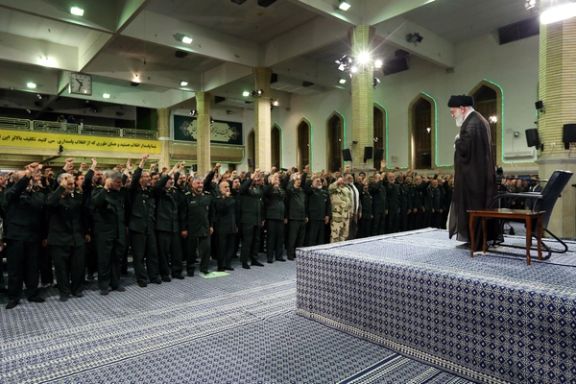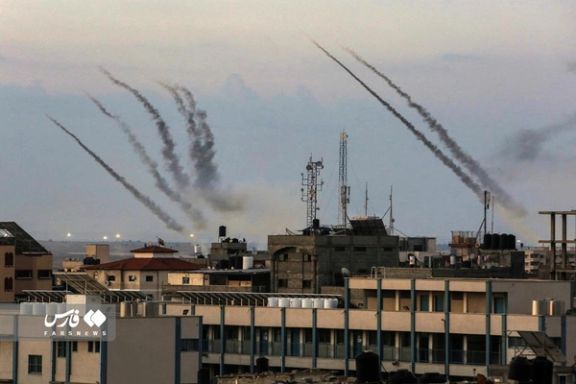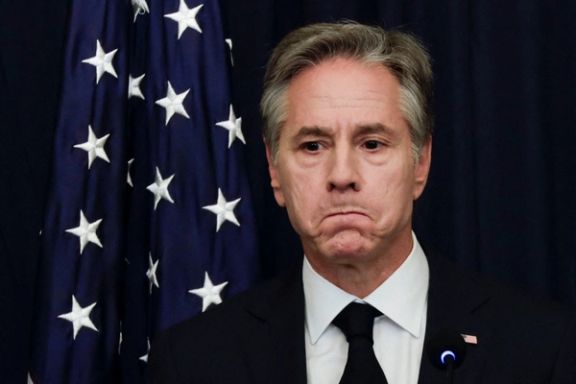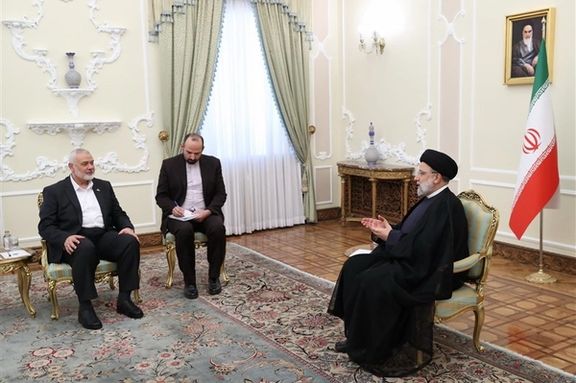Elon Musk Calls On Iran’s Khamenei To Set Hate Aside

Elon Musk has called on Iran’s Ali Khamenei to change his anti-Israel policy, posting on his social media platform X, where the Iranian ruler also is allowed to have an account.

Elon Musk has called on Iran’s Ali Khamenei to change his anti-Israel policy, posting on his social media platform X, where the Iranian ruler also is allowed to have an account.
Musk, speaking out on Sunday after the large-scale terrorist invasion of Israel that has killed more than 700 Israelis, said, “Khamenei’s official position is clear that the eradication of Israel is the actual goal, not just supporting Palestinians,” and added, “That will never happen.”
Khamenei who has multiple accounts on X (formerly Twitter) uses the platform to spread hateful speech. Activists have been long urging both Twitter’s former management and later Elon Musk to ban Khamenei from the platform. However. Khamenei was again to publish a post after the attack on Israel, although a note below the post said it “violated the X Rules,” but the company “determined that it may be in the public’s interest for the Post to remain accessible.”
Musk addressed Islamic Republic’s ruler, saying, “Stoking the fires of hatred isn’t working. Perhaps it is time to consider something else.”
Khamenei and many other Iranian officials over the years have called for the destruction of Israel and for decades have financed and armed militant and terrorist groups in Lebanon, Palestinian territories and other regional countries.
The Iranian regime has congratulated Hamas for its terror attack, while hundreds of Israelis including women and children have been kidnapped and taken to Gaza under inhumane conditions.

Hamas' 7/10 invasion and terror attack on Israel, akin to Egypt's 1973 October surprise, shall be remembered as a most infamous day in Arab-Israeli conflict.
In the wake of the attack, experts have scrambled to account for the failure in Israeli intelligence. The answer seems to be hiding in plain sight: the IDF and intelligence is overtaxed and overworked. Hamas’ patron, Iran, has escalated its anti-Israeli intelligence and sabotage plots over the past seven months to an unprecedented scale. Indeed, on September 11, 2023, Israel’s intelligence chief announced their success in thwarting twenty-seven attacks planned by Iran against Israeli citizens and Jews around the world. He further warned Iran that should the attacks persist, Israel would retaliate directly against the main culprits of the attacks in Tehran.
The escalation in planned attacks over the past seven months correspond to the amount of time roughly needed to plan the 7/10 invasion. Whether these planned attacks were meant to distract Israeli forces is unknown. However, thwarting twenty-seven attacks certainly drained a lot of intelligence resources.
Now, on the second day after the attack, Biden administration officials announced on CNN that Iran was directly involved in Hamas’ ruthless mass carnage in Israel.
Asymmetrical surprise attacks on Israel are not unprecedented. Palestinians had previously infiltrated Israel with gliders once before in November 1987, and no doubt Hamas leaders used “the Night of the Gliders” as a template. Israel swiftly launched retaliatory attacks and an incursion of a magnificent scale is only days away.

Since its founding in 1979, the Tehran regime has made no friends but rogue actors (Syria and Libya) in the region. It has vowed to destroy Israel as an article of faith and export its revolution to other Arab states.
Hatred for Israel is quintessential to the regime’s fanatical character, even more than its disgust for the region’s Arab states. The Mullahs in Tehran have acted as patrons to the Lebanese Hezbollah and Palestinian militants (Islamic Jihad and Hamas) by supplying them with missiles to attack Israel over the past twenty years, prompting Israel to oblige in kind.
Avowing Israel’s destruction, the Iranian regime has also sought to gain all the needed material for possible nuclear weapons production. Israel has bludgeoned the Iranian nuclear program with debilitating attacks deep inside Iran, as well as surgical strikes against Hezbollah and the Iranian Islamic Revolutionary Corps (IRGC) in Syria. Waging a proxy war with Saudi Arabia and UAE in Yemen since 2015, the Iranian regime cut ties with the Saudis over regional differences during the same period, only to renew relations in March 2023 with China’s mediation.
Tehran greeted the rapprochement of the Israel-Persian Gulf Arab states and the Abraham Accords with loathing, and finds the Saudi-Israeli rapprochement equally appalling for it could herald the establishment of the Peninsular Shield Force against Iran. As the Saudis conditioned their rapprochement with Israel on Israeli concessions to the Palestinian authority, the rapprochement would elevate the Palestinian Authority’s position eclipsing Hamas to the point of irrelevance.
Wary of the Saudi Israeli rapprochement, Hamas leaders increased their overt and covert visits to Tehran. One can only speculate what sabotage and terror operations did they concoct during these visits. Then, only four days before the attack, Iran’s supreme leader Ali Khamenei exclaimed Iran’s animosity towards the Saudi Israeli rapprochement: “The definite position of the Islamic Republic is that countries that make the gamble of normalisation with Israel will lose. They are betting on a losing horse.” Only with the benefit of hindsight can we now decipher Khamenei’s words as a prayer to derail Saudi Israeli rapprochement, signalling the Hamas 7/10 attack.
From the early hours of the conflict, many observers have been quick to blame the 7/10 intelligence failure on Israel’s domestic strife over the government’s proposed judicial reforms. Some cite as evidence the letter by several ex-government security advisors to the speaker of the Knesset who warned “the lack of agreement (over judicial reforms) could undermine Israel’s security, as “the national resilience of Israeli society” has enabled the country to tackle external threats.”
However, Israel has been unrelenting in its deterrence operations.Israel’s “intelligence failure” could be equally ascribed to “alert and constant readiness fatigue” as they ever more vigorously implemented the Israeli deterrence doctrine. But to attribute the “intelligence failure” to domestic Israeli peaceful protests over the judicial reforms grossly underestimates the undisputed track record of the Israeli intelligence and security services and the IDF. After all, Israel has been ruled by right-wing coalition governments over the past twenty years along a consistent national security doctrine.
As Israel continues to wage its deterrence war against Iran, the burden of its task has overwhelmed its resources. The last word on the intelligence failure must be left to the aegis of Israeli parliamentary democracy, military, and security echelons as Israel persists as determined as ever.

US Secretary of State Antony Blinken said Sunday that the Biden administration does not have any evidence of Iran’s involvement in the terrorist attacks on Israel.
"In this specific instance, we have not yet seen evidence that Iran directed or was behind this particular attack, but there’s certainly a long relationship." The statement came in response to the ongoing attacks launched by Hamas fighters on Israel's southern region, resulting in the death of hundreds and the capture of civilians and soldiers.
Blinken's statement contradicts years of evidence which has proven that Iran pays Hamas around $100m annually, as was announced in 2018 by the then Middle East envoy Jason Greenblatt, under the Donald Trump administration.
In spite of evidence to suggest the Saturday morning attack which began with a barrage of thousands of rockets fired into Israel's southern region, followed by a land, sea and air invasion of troops, was carefully planned, Blinken tried to suggest the attacks could have been a way to destabilize US-brokered discussions of normalization between Israel and Saudi Arabia which have only in recent weeks gained momentum.
Blinken instead said that rather than Iran being behind the assault in which Hamas declared war on Israel, it could instead have been Hamas and Hezbollah, which are both Iran-backed proxies. In the nonsensical explanation, he said, "Look, who opposes normalization? Hamas, Hizballah, Iran. So, it wouldn’t be a surprise that part of the motivation may have been to disrupt efforts to bring Saudi Arabia and Israel together".
Many politicians and ordinary Americans have raised concerns about whether the recent $6bn of released Iranian funds in exchange for five dual nationals, could have helped fund the attacks which have been raging since Saturday at dawn. "No US taxpayer dollars were involved. These [$6bn] were Iranian resources that Iran had accumulated from the sale of its oil that were stuck in a bank in South Korea.”
He alleged that not a single cent had been spent from that account, with strict limitations on its use for medical supplies and food.
As the conflict continues to impact Israeli civilians, Secretary Blinken said the onslaught "should be something that revolts the entire world."

Iran's President Ebrahim Raisi has spoken with leaders of Palestinian terror groups, Hamas and Palestinian Islamic Jihad, one day after Hamas launched a surprise attack on Israel.
Raisi discussed the developments in calls with Ziyad al-Nakhalah, secretary general of the Islamic Jihad Movement, and Ismail Haniyeh, the head of the Hamas political bureau, according to the state news agency.
Iran has praised the Palestinian attack, describing it as a "proud operation" and a "great victory" and celebrations have been ringing out in Tehran.
“This victorious operation, which will facilitate and accelerate the collapse of the Zionist regime, promises the impending destruction of the Zionist regime,” said Ali Akbar Velayati, a senior adviser to Iran’s Supreme Leader Ali Khamenei.
“I am congratulating this great and strategic victory, which is a serious warning to all compromisers in the region,” he added in a letter to Hamas and Islamic Jihad, presumably referring to Arab nations that have established diplomatic relations with Israel since the 2020 US-brokered Abraham Accords.
Fereydoun Abbasi, a member of the Iranian Parliament echoed the sentiments of Israel's destruction: "With the advanced weapons we have, we can destroy Israel. We have things they are unaware of.”
The Hamas terror group launched a surprise operation against Israel in the early hours of Saturday, the holy Sabbath and a religious holiday. They first fired thousands of rockets towards Israel before its fighters infiltrated into Israeli territory through air, land and sea.
Local media reports at least 600 Israelis have been killed, and more than 2,000 others have been wounded. Dozens more are believed to be held hostage in Gaza.
In the Israeli retaliatory attacks on Gaza, which have targeted Hamas positions and facilities, over 300 are said to have been killed, and hundreds of others wounded.

An Iranian Baha'i citizen has had a prison sentence of more than ten years upheld by an appellate court for possessing religious books and materials.
Officials have cited Sanaz Tafazzoli, was also "organizing educational groups for Baha'i children" among the charges brought against her, the latest case one in a long line facing persecuted Baha'i in Iran.
The charges brought against her include "forming a group with the intent to disrupt internal security," resulting in a sentence of six years and six months. Additionally, she received a three-year and seven-month prison term for "collusion and conspiracy to commit a crime against national security," and eight months for engaging in "deviant educational or promotional activities."
The 1979 constitution of the Islamic Republic only officially acknowledges Islam, Christianity, Judaism, and Zoroastrianism as recognized religions. Supreme Leader Ali Khamenei, in a religious verdict issued in 2018, prohibited any form of contact, including business interactions, with adherents of the Baha'i faith.
Tafazzoli was arrested at home last November in Mashhad by agents of the Ministry of Intelligence, and imprisoned in Vakilabad Prison.
The Baha'i population, estimated to be approximately 300,000 in Iran and the largest minority, are routinely arrested and detained. They frequently experience harassment, are coerced into leaving their residences and businesses, and face discrimination in terms of access to government employment and higher education opportunities.

Iranian academics' assessment of Iran's critical economic situation, which hinders its development, appears to be backed by credible international statistics.
Mahmoud Sariolghalam, an Iranian academic, emphasized the importance of a country having sufficient income for cultural and social growth. He also pointed out that a country without sufficient income lacks international credibility and faces constant challenges to its stability and security.
These statements are reinforced by alarming statistics that highlight Iran's significantly lower gross domestic product (GDP) compared to other Middle East and North Africa countries. In 2022, Iran's GDP was $350 billion, while Saudi Arabia's was $1,100 billion, Israel's was $522 billion, the UAE's was $507 billion, and Egypt's was $475 billion, according to Statista.
Last week, when visiting Esfahan, President Ebrahim Raisi said with a tongue-in-cheek gesture: "If we do not invest in industrial development, we will lag behind others. If we do not invest in the oil and petrochemical industries, our share of the shared oilfields with other countries will become insignificant."

However, Iranian journalist Ehsan Bodaghi reminded Raisi in a tweet that "Even a student of economics knows this simple fact. He should say how effective investment is possible without lifting the sanctions?"
Sanctions that the United States imposed in 2018 after withdrawing from the JCPOA nuclear accord have immeasurably weakened Iran’s economy, which was already suffering from government control, corruption and mismanagement.
Knowing that most of Iran's problems stem from its shaky relations with Europe and the United States, Azizollah Hatamzadeh, the author of the book Iran's Trans-Atlantic Relations published by the Iranian government's Strategic Research Center, told Khabar Online in Tehran that some of Iran's problems stem from the United States' attempts to create a security situation around the Islamic Republic.
Like most scholars and analysts in Iran, Hatamzadeh also failed to mention Iran's share in creating problems for itself. While accusing the United States and Europe of conspiring against Tehran, he -possibly deliberately- forgets what Iran has been doing to US interests in the region and how it has disrupted its normal ties with Europe by taking European citizens hostage, threatening Iranians in Europe and engineering assassination attempts in Europe against Iranians and non-Iranians.
Hatamzadeh discussed the post-Cold War developments in Iran's relations with the West and noted Donald Trump's influence in changing those relations. He also mentioned that Trump challenged traditional US-Europe ties and predicted that disputes between the US and Europe might resurface if Trump won the next US presidential elections.
The author generally believes that the United States has always managed to convince Europe to follow Washington's policies toward Iran.
This feeds into part of the Iranian establishment's belief in the fallacy that differences between the US and Europe will prompt Europe to invest in Iran. That is impossible as long as US and other sanctions are still in effect. On the other hand, Iranian scholars keep forgetting that it was Europe that recently decided to extend the embargo on Iran's missile development plan beyond its mid-October deadline.
Meanwhile, Moscow's war on Ukraine has made the West even more united and this unity will continue as long as the war continues. Hatamzadeh, however, acknowledged that as a result of the Ukraine war, Europe recognizes Iran as a security challenge regardless of its proximity to or its distance from the United States.